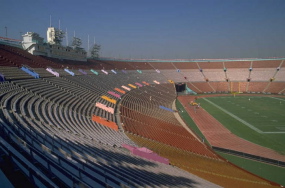
Prague, 6 August 2004 (RFE/RL) — She might not be the favorite to win. But when Robina Muqimyar runs the women’s 100-meter dash in Athens at this month’s Olympic Games, she knows she’ll be attracting a lot of attention.
That’s because Muqimyar — and her teammate, judoka Friba Rezihi — are the first ever women to represent Afghanistan at the Olympics.
And Muqimyar will be running in an outfit that will contrast sharply with the tight-fitting shorts favored by most female competitive runners.
“I will try to wear clothes [appropriate for] the situation in Afghanistan. I’m Muslim, so I will try to wear clothes that cover all my body. Afghanistan is an Islamic country. I will wear long trousers to cover all of my legs. But my sleeves will be short,” Muqimyar said.
For many Muslim sportswomen, Islamic traditions of female decorum can have a direct influence on whether they participate in top international events like the Olympics.
Experts say Islam encourages sports and physical activity for all — the Prophet Mohammed is said to have invited his wife, Aisha, to a foot race and finished a distant second.
To be sure, many Muslim nations — notably the Central Asian republics and many countries in Southeast Asia — put no special restrictions on their sportswomen. Female badminton player Susi Susanti became the first Olympic athlete to win a gold medal for Indonesia, the world’s most populous Muslim nation. Olympian Zebuniso Rustamova, who competed under the Soviet flag (1976 Montreal Games, bronze medal), popularized the sport of archery for an entire generation of women in Tajikistan.
But in some conservative Muslim countries, sports are permissible only if strict guidelines on modesty are observed. For women, that means covering their bodies and hair. In a handful of countries like Iran, it even means prohibiting women from participating in sports unless there are no men nearby.
Breaking these customs has gotten at least one female Olympian into trouble. In 1992, Hassiba Boulmerka of Algeria was wearing contemporary running shorts when she won the 1,500-meter race. She was later denounced by critics at home for “running with naked legs in front of thousands of men.”
Still, would Boulmerka have won the gold if she had run the 1,500-meters dressed in traditional Islamic clothing? In most sports, Islamic robes and head scarves would make it impossible for an athlete to perform at her best.
There are some exceptions. Olympic competitors Lida Fariman (Barcelona 1992, Atlanta 1996) and Manijeh Kazemi (Sydney 2000) both wore the hijab and chador when competing for Iran in pistol- and rifle-shooting.
Iran will send a third woman shooter, Nassim Hassanpour, to Athens this year. But certain Olympic sports remain out of reach for Muslim athletes required to wear traditional dress.
Mahin Gorji, a journalist in Tehran who specializes in women’s sports, says Islamic clothing requirements prohibit Iranian women from competing in most Olympic sports. In others, where robes and head scarves would not be a detriment, the sportswomen are simply not good enough.
“[Iran’s] women have not been able to meet [the Olympic] standard in Taekwondo and canoeing. They cannot compete in volleyball or swimming or any of the sports other women in the world can participate in, because of dress restrictions. So only Nassim Hassanpour will participate in the Olympics,” Gorji said.
So how to reconcile religious rules with international sports events?
Iran holds an alternative international event, the Muslim Women’s Games, every four years. Men are not allowed to attend, so the athletes are free to dress as they like.
But this hardly matches the prestige of the Olympics. And some activists say that’s where any top female athlete should be able to compete, regardless of her religion.
Paris-based lawyer Linda Weil-Curiel is leading a campaign to force countries to include women in their Olympic delegations.
The group, called Atlanta-Sydney-Athens Plus, started its campaign after the 1992 Olympics, when 35 countries — half of them Muslim — sent no women athletes.
Weil-Curiel says all-male delegations contravene the Olympic charter, which forbids all forms of discrimination.
“Just like South Africa [was] banned [from the Olympics] for nearly 30 years because of its apartheid policy, we want the countries who do not allow women to participate to be excluded from the Games. They have to respect the rules of the Olympics, or they don’t participate. Why should [the Olympics and other sports events] comply with religious requirements? We’re talking about sports, not religion,” Weil-Curiel said.
Since Weil-Curiel’s group started its campaign, the number of countries sending all-male delegations has dropped.
Only nine countries failed to send women to the Sydney Games in 2000. And this year, according to Weil-Curiel, only four or five mainly Middle Eastern countries — such as Saudi Arabia — are expected to send only male athletes.
Advances in sportswear have helped boost the participation of Muslim women, as well.
The invention of full-body swimsuits was welcomed by many Western swimmers for their ability to cut down water resistance. But the suits have also allowed Pakistan — which sent its first woman to the Olympics just eight years ago — to send its first female swimmer to Athens this year.
But for some female Muslim Olympians, what to wear is a secondary issue.
Afghan sprinter Muqimyar says what matters most is that she’s going to be in Athens, representing Afghanistan.
“The most important thing for me is that I am taking part in the Olympics. I want to take part so that other countries know Afghanistan is in the competition. When people see the Afghan flag in the Olympics, I’ll be proud,” Muqimyar said.
Faridah Saifi of RFE/RL’s Afghan Service and Golnaz Esfandiari of RFE/RL’s Persian Service contributed to this report.
© 2004. RFE/RL, Inc. Reprinted with the permission of Radio Free Europe/Radio Liberty, 1201 Connecticut Ave., N.W. Washington DC 20036.
Website: http://www.rferl.org/